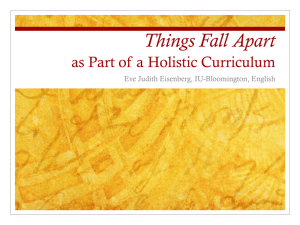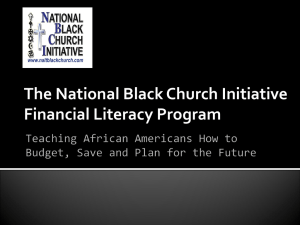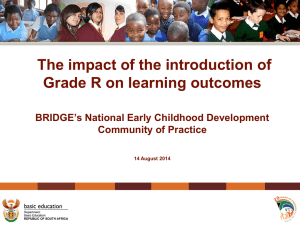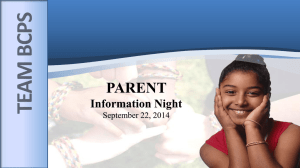SAPA Presentation on Reading Plans
advertisement
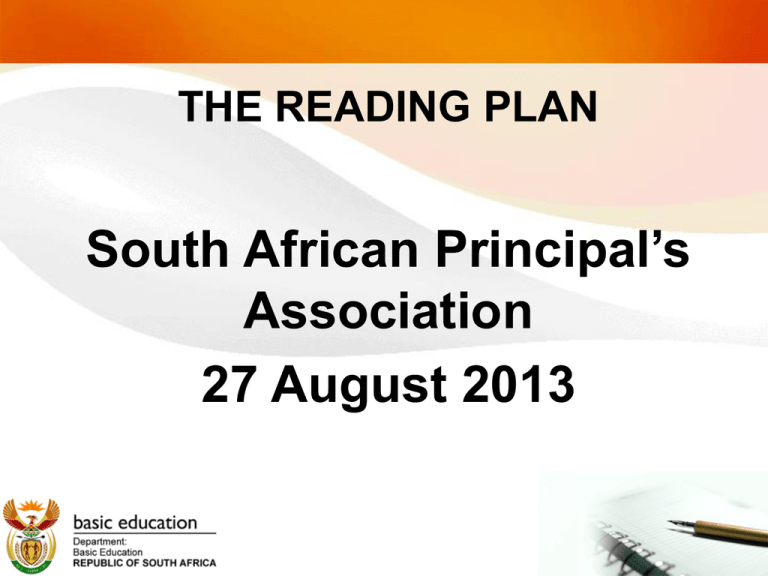
THE READING PLAN South African Principal’s Association 27 August 2013 PURPOSE To request the NCF to note : – the reading plan has been developed as a response to the core recommendations that were made on reading in the Ministerial Audit Reading report and the NEEDU and PIRLS reports; and – provincial progress on reading. OVERVIEW COMMENTS • The DBE and the PEDs concur with the findings in the reports. • The recommendations made in the reports are part of the DBE and PEDs plans and therefore will be intensified. • The focus on reading is the key strategic lever for improvement of performance and a reading plan has therefore been finalised and is being implemented by provinces. • The reading and literacy requirements in CAPS have been up fronted in the Reading plan. . Research Reports on Reading 1. Progress in International Reading and Literacy Study(PIRLS) 2. National Education Evaluation and Development Unit(NEEDU) 3. Ministerial Reading Audit Report 4 PIRLS Progress in International Reading Literacy Study (2001 to 2011) 5 REFLECTIONS Recommendation What is being done? What will be done? Improve quality of reading instruction in schools whilst attending to the LiEP 1. Workbooks in Grades R 1. Targeted in-service teacher to 3 in all African training in all African languages languages (TD plan) 2. Ongoing support for 2. Training programmes for SMT’s reading instruction on curriculum implementation (CAPS orientation; and management (PDEs) support documents; and targeted training to underperforming schools Schools must be adequately to well resourced and well managed 1. National Catalogue 1. Classroom library in primary (Grades 1-12) schools 2. Workbooks in Grades R 2. Increase the number of to 6 centralised school libraries REFLECTIONS... Recommendation What is being done? What will be done? Improve literacy levels in rural communities 1. Kha Ri Gude – adult literacy programme with focus on rural areas. 2. Provincial partnerships with NGOs (eg mobile libraries); ASIDI schools (media centres) 1. Targets are set at school level, depending on previous achievements (ANA) 1. Intensify and introduce family literacy programmes in rural communities (PDEs) 2. Access to ICT reading support materials Pockets of excellence to achieve higher performance levels. Continued and close monitoring of reading literacy in all languages 1. Identify and incentivise schools of excellence 2. National reading and spelling competitions 1. ANA , SACMEQ and PIRLS 1. Implementation of national analysis reading assessment with clear benchmarks for different grades, ages in all languages RECOMMENDATIONS FROM 2012 NEEDU ANNUAL REPORT LANGUAGE Recommendation What is being done? What will be done? Commission the writing of graded sets of reading materials for the nine official African languages. 1. The DBE produces a 1. Catalogue of textbooks National Catalogue which includes readers for 2. Sepedi Graded FAL. Readers and 2. Special Call for books in Setswana Big Books categories for which there have been are no books on the existing developed. catalogue. 3. Develop Graded Readers and Big Books for the Foundation Phase; Core Readers and Graded Readers for the Intermediate Phase at FAL 4. Engage in around-table discussion with providers LANGUAGE... Recommendation Language standardisation What is being What will be done? done? Language 1. Set up a Language Task standardisation has Team that will research been effected in the language standardisation of development of : the 9 African languages and CAPS; the develop: Foundation Phase a glossary of documents terminology the Foundation guidelines to strengthen Phase Workbooks teaching and learning in the Annual the 9 African languages National Assessments. LANGUAGE... Recommendation What is being done? DBE Workbooks Language standardisation What will be done? 1. Commission a team of African language children’s National Catalogue authors and NGO’s to has a prescribed list produce high quality Big of Big Books, Books, Graded Readers and Graded Readers, an anthology of children’s Phonics stories, poems and rhymes Programmes in all for Grades R to 3 in the 9 official Languages at African Languages. the Home Language 2. Develop a standardised level. phonics programmes 3. Develop digital reading materials LANGUAGE... Recommendation What is being done? 1. Implementation of the Teacher Development Programmes for Framework with improving the proficiency focus on priority of teachers and learners subjects and in their chosen LOLT and underperforming FAL. Provinces schools investigate such programmes. Led by 2. DBE has begun a Subject Advisors. programme in EFAL for FP teachers. What will be done? 1. Accredited CPTD programmes to strengthen teacher’s proficiency in LoLT and FAL 2. Recruitment of coaches who are proficient in the LoLT and FAL 3. Tighter monitoring of quality and quantity of programmes by DBE and PEDs and provision of EFAL for IP, SP and FET programmes at all levels. AFRICAN LANGUAGES Recommendation What is being done? What will be done? The current shortage of African language teachers indicates that implementation should occur with caution, and only when teachers are available. 1. Policy Framework for Teacher Training and development 1. Accredited CPTD programmes in African languages to be offered to Foundation Phase teachers in the system. 2. Plans in place for orientation of teachers for IIAL and on-going support. 2. Planning for incremental introduction of African Languages in 2014 WORKBOOKS Recommendation The DBE workbook programme should be continued. What is being done? What will be done? 1. As per the plan, 1. Increasing number of workbooks are workbooks continuing for the 2. Introduction of digital next three years. Workbooks ( ASIDI schools) 2. For 2013 academic 3. Audio clips of Workbooks year workbooks content on CD and DVD, delivered IPOD (EFAL in multi-grade 3. Available in Braille schools) in the African languages. 4. First Additional Language level for African languages and Afrikaans WORKBOOKS (2) Recommendation What is being done? What will be done? Workbooks should be 1. Books have been 1. Reference team meets assessed against the screened and annually to improve the curriculum and amended aligned to CAPS quality of the workbooks Teacher guides should be 1. Teacher guide has 1. Teacher training workshops developed been developed and have commenced will be used for training of district officials Learners should work 1. Forms part of the 1. Intensify monitoring and systematically through the monitoring reporting. workbooks 2. Structure of the workbooks facilitate easy reference READING Recommendation What is being done? What will be done? Children to read at least one book per week; classes have at least 3040 readers available 1. Included in reading plan Mathematics textbook in 1. Part of the national the Foundation Phase catalogue 1. Establishment of a classroom libraries in primary schools 1. Intensify monitoring and reporting. ANA Recommendation What is being What will be done? done? Use of the ANA scores 1. Diagnostic analysis 1. Intensify monitoring to help schools and remedial plans undertake useful item formed basis of analysis Road shows conducted 2. Make available on websites and distributed to schools Ministerial Reading Audit Report Overview: Ministerial Reading Audit Team was appointed to investigate the implementation of reading programmes across provinces. The mandate given to the Audit Team was to go beyond a catalogue of what is being done and to analyse and identify the different kinds of support needed to strengthen reading programmes across the system. 18 Findings and Recommendations Recommendation Teacher training and support programmes to be accelerated What is being done? Foundation Phase/ IP/SP teachers trained on reading methodologies prescribed in CAPS What will be done? Focussed reading workshops on reading methodologies and writing in underperforming districts Optimal utilisation of the DBE Teacher manuals have Teacher training workshops on Workbooks been developed to enable effective use of DBE Workbooks usage of Workbooks (class visits to monitor usage) Findings and Recommendations Recommendation What is being done? Curriculum Advisors should be trained on CAPS content(reading methodologies and skills) Curriculum advisors have 1. Capacitation programmes for been trained on CAPS curriculum advisors content and reading methodologies Provisioning of quality reading National Catalogue of resources prescribed resources for Grades 1 to 12 and DBE workbooks What will be done? Monitor LTSM procurement processes used in provinces READING PLAN AND READING INTERVENTIONS 21 READING PLAN FOR GRADES R TO 12 Purpose: To improve literacy and reading outcomes in Grades R to 12 by monitoring and supporting the delivery of reading and literacy programmes at classroom level and to clarify the roles and responsibilities of the school, district, province and DBE with regard to supporting reading interventions. Roles and Responsibilities Classroom School Frequency of reading Lessons Monitor classroom lessons District Province DBE School based Conduct Monitor and support Reading and evaluate programmes Writing reading Workshops interventions Teaching Provisioning Monitor as per Methodologies and utilisation LTSM reading plan Utilisation and Procurement Curriculum of resources provisioning procedures coverage as of resources per CAPS School and Reading Reading classroom Assessments Assessments Use of reading libraries resources Reading Reading Reading Reading norms norms Assessments events and festivals Classroom libraries Monitoring Reading Interventions Provinces have been requested to submit quarterly reading reports on the last Tuesday of every term. The reporting is being done on these :four pillars 1. Provisioning and utilization of reading resources 2. Monitoring and evaluation(accountability) 3. Advocacy and Communication 4. Library and Information Services 24 Eastern Cape Provisioning and utilization of reading resources • FAL Guidelines developed and distributed to all districts • Teaching and Learning Resource booklet developed with ITEC for HL isiXhosa FP schools • Classroom libraries established in most schools • LTSM provided as per CAPS requirements for Grades R to 12 Monitoring and evaluation • Monitoring tool being developed to collect evidence of interventions • Quarterly reading and literacy assessments • Reading norms( specify number of books read and words learnt for R to 3) Communication and advocacy Use of reading clubs, reading festivals Library and Information Systems Mobile libraries in a few districts, new libraries and media centres in ASIDI schools Book exhibitions Gauteng Provisioning and utilization of reading resources Exceeded CAPS requirements for reading resource provisioning in H/Language, FAL and African languages in Grades R to 12 Monitoring and evaluation Frequency of reading and literacy lessons CAPS literature norms for Grades 7 to 12 Communication and advocacy Reading booklet for parents, homework support policy Library and Information Systems National Guidelines for library Services distributed to all schools Trolley libraries and mobile libraries, utilization municipal libraries FREE STATE Provisioning and utilization of reading resources Provided Reading Resources as per CAPS requirements for grades R to 12 to all schools Monitoring and evaluation Conduct school visits in underperforming districts Reading norms as per CAPS requirements for Grades 1 to12 Administer quarterly assessments Communication and advocacy MoU with Dept of Arts and Culture host jointly Provincial Spelling Bee Competitions and Literacy Events Library and Information Systems: Budget of R6m for library resources 27 KwaZulu Natal Provisioning and utilization of reading resources • Big Books, Graded Readers to all FP classes • Charts procured for schools • Manual on How to develop and implement a reading programme developed • Reading Strategy document distributed to all schools Communication and advocacy • KZN Literacy calendar issued to schools • Teachers encouraged to join the Reading Association of KwaZuluNatal Limpopo Provisioning and utilization of reading resources • Big Books, readers and FP CDs with stories in indigenous languages, English readers for Grades 4-7 Roles and responsibilities and accountability across the system • Training and support by province and district Research monitoring and evaluation • Monitoring and evaluation through sampling of schools by all levels Communication and advocacy • Strategy shared with District Heads and Curriculum advisors Mpumalanga Provisioning and utilization of reading resources Provided Reading Resources as per CAPS requirements for grades R to 12 to all schools Monitoring and evaluation • Monthly and quarterly assessments assessments were administered at schools in March/June 2013 • Reading and literacy norms as per CAPS requirements Communication and advocacy Radio talk shows on reading for GET and FET Reading and Literacy festivals Northern Cape Provisioning and utilization of reading resources Provided reading resources for Grades R to 12 as per CAPS requirements Monitoring and evaluation Conduct school visits in underperforming districts Reading norms as per CAPS requirements for Grades 1 to12 Administer quarterly assessments Communication and advocacy Launched the Provincial Literacy Strategy on the 31 May 2013. Communicated the strategy to SGB members, principals and teachers. Library and Information Systems NGOs: Rally to Read, Sanparks Mobile Libraries,BREADLINE AFRICA PROJECT, BIBLIONEEF North West Provisioning and utilization of reading resources • Teachers using workbooks for shared reading Research monitoring and evaluation • Area offices using analysis of quarterly assessments to give support to schools especially in 5 poor performing schools per Area Communication and advocacy • Reading competitions in some Areas Western Cape Provisioning and utilization of reading resources Exceeded CAPS requirements for reading resource provisioning in H/Language, FAL and African languages in Grades R to 12 Monitoring and evaluation Frequency of Reading programmes as per CAPS requirements in Grades R to 12 Conduct internal annual systemic assessments Reading norms set by schools Library and Information Systems The orientation of district officials, principals and teachers on the implementation of the NGSLIS (National Guidelines for School Library and Information Services) has been started. WAY FORWARD • Develop National Reading baseline tests using EGRA model. • Establish National Reading norms based on national and international reading studies • Monitor provisioning and utilization of reading resources • Provide ongoing training and support for reading instruction • Work closely with partners to intensify support for reading programmes in the system THANK YOU 35
